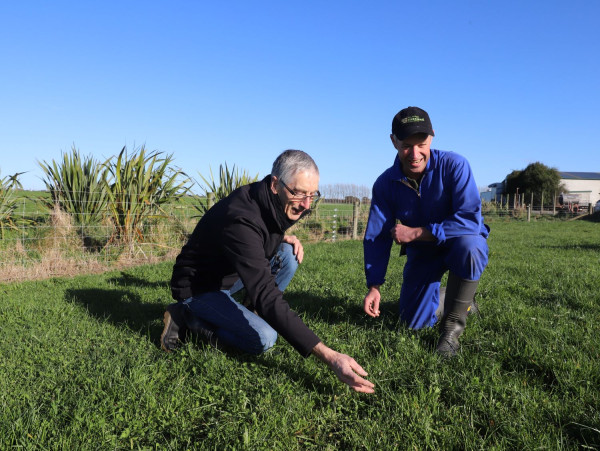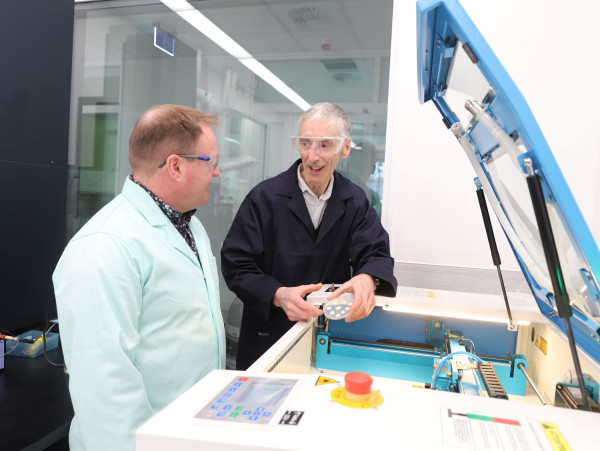
And as you can see (above) a family of Meerkats, scanning the horizon, working as a team, is lesson No 1.
The second is, ‘adapt fast and with care’ which David translates into shorthand. It means ‘don’t be a luddite’.
The third is ride the funding wave, and this correlates to David’s own career-defining research on endophytes, a wave he’s still riding.
David believes the lessons which were learned and relearned during his career, are as relevant today as they have ever been given the current science sector is being reviewed, funding is tight and opportunities seemingly scarce.
The bit that is missing, from the slides at least, is the how. The how do you adapt, how do you ride a funding wave, and how do you look for opportunities?
For that we’ll need to delve a little deeper into David’s story and go back to where it all began.

David enjoys getting his hands dirty in the field and staying connected and talking directly to farmers. "It's where our best ideas often come from".
David is a Cantabrian, and he was born and raised in a house beside a main Christchurch thoroughfare. In cities today, houses beside utilitarian infrastructure such as four-laned carriageways that link an airport to a CBD, are at best nondescript. However, Memorial Avenue was, and still is, home to some of the city’s most preeminent gardens.
In spring they burst with colour. They are a rare confluence of green thumbed and house proud homeowners. David’s father was an ordered man and loved his garden. This instilled in his son an early love for the environment. After graduating high school, he enrolled at Lincoln College (now Lincoln University), and majored in agricultural science. He excelled and had his pick of a handful of jobs upon graduation. He chose the DSIR at Grasslands. Opportunities abounded including a sponsored a scholarship to become the first New Zealander to study for and be awarded a PhD from Wageningen University in the Netherlands.
David and his wife Karen returned home from their three-year stint in the Netherlands with two children and put down roots in Palmerston North. During a short scholarship in Victoria, Australia, in the mid-1990s, he developed professional connections and worked on endophyte trials.
Endophytes are fungi that live inside the tissues of many plants. They form a finely balanced interrelationship where the endophyte protects the plant from pests in return for nutrients and a safe home.
Scientists had discovered they could transfer them from plants from different parts of the world and put them into productive NZ cultivars. And David, ever alert to an opportunity, used his agronomy skills to grow and test them in plots and paddocks.
“Alison Popay (a fellow senior scientist) and I seem to get a lot of credit for this work but really, we were just part of a big and special team – and we’re simply the last ones standing!”

The best slide in David’s presentation about his career is depicted above.
It captures and encapsulates what David means by team being a team sport and explains his discomfort with his name being attributed to the success of AR37.
Take a look at the team and list of all their various skills. It serves to also illustrate what scientists mean by multi
Harry Truman is credited with saying “it is amazing what you can accomplish if you do not care who gets the credit”. “My success has been because of the success of the team around me”.
A rather youthful looking David is standing front and centre frame (fourth from the left).
It was a period in his career when he still had dirt under his fingernails.
David is now ostensibly a manager tied to a desk who also does important work with stakeholders.
But those who work with him say he is rarely confined to just one role. He’s famous for becoming the guy who starts conversations about all kinds of topics in all parts of the Grasslands campus.
His happy place is the work café where he can exercise his intellectual curiosity and parachute in conversations with different teams.
There’s a metaphor to be made with how David behaves and how endophytes form interrelationships with plants in return for nutrients and a safe home.
He looks for opportunities. And he loves riding those waves.

David and a colleague conducting lab trials.
His teams are and disease resistance.
David remains as enthused by the prospects and challenge of adapting the science as ever.
“The more things change, the more they stay the same.
“In the 1980s, our plant breeders developed all these amazing cultivars, which we effectively gave away, because that’s what public and government scientists did then. A much more commercial focus was introduced and that coincided with our endophyte research. The early plants we inoculated with endophytes didn’t look promising at all so when I look back now, I remind colleagues and our stakeholders of how far we have come and how far we still might go. That if we concentrate on ensuring the quality of the science and data is robust. That if we are disciplined in those two areas then the results will speak for themselves.”
To provide context, AR37 has been estimated to contribute $3.6 billion to the economy through the life of its patent. Now gene editing technology could provide even greater benefits through targeted changes to these endophytes, and David can’t wait to ride the next wave, face new challenges, meet new people, draw on all his past experiences and keep contributing to the team.
“Over my career, as I have purposefully developed relationships with science and commercial organisations beyond DSIR and AgResearch, I have worked with some amazing people across the world who are to be admired and have shaped the way I think (and act). In some cases they have become lifelong friends. We are all trying to make a difference with a common goal, no matter where we are on the globe. These relationships across the world, have made, and still make, my career very rewarding - part of what makes science a fulfilling career.”